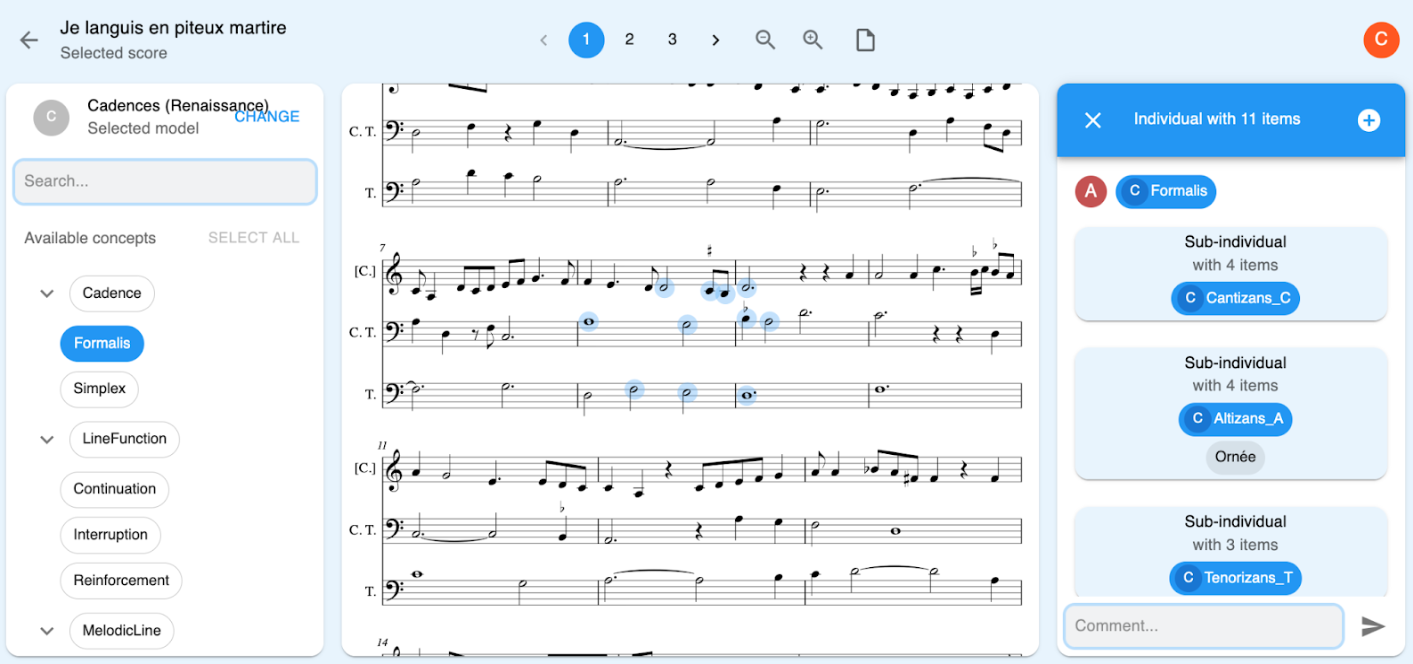Patent for online collaborative interface for Music Analysis ‘TONALITIES’
TONALITIES, IReMus’ pilot for musical heritage data project Polifonia, develops tools for the modal-tonal identification, exploration and classification of monophonic and polyphonic notated music from the Renaissance to the twentieth century. Now, the tools are available for use within the TONALITIES Interface for music analysis. Additionally, a patent was recently acquired for this collaborative interface by the IReMus lab.

TONALITIES, IReMus’ pilot for musical heritage data project Polifonia, develops tools for the modal-tonal identification, exploration and classification of monophonic and polyphonic notated music from the Renaissance to the twentieth century. Now, the tools are available for use within the TONALITIES Interface for music analysis. Additionally, a patent was recently acquired for this collaborative interface by the IReMus lab.

Semantic web technologies and AI to aid in music analysis
The TONALITIES user interface includes interactive music analysis tools to support informed and guided analytical inquiry. It provides an annotation environment that allows the comparison and commentary of different analytical viewpoints when studying musical scores. The software uses semantic web technologies to produce theoretical models whose concepts can be associated manually, and eventually using artificial intelligence, with arbitrary musical selections via a highly ergonomic interface.
This interface is intended for a variety of audiences – cultural institutions; higher education, secondary education and specialist music training; professional performers; researchers and the music industry. The aim is to highlight different musical properties by comparing points of view and keeping track of the reasoning that led to the production of documented and signed musical analyses. Users can do this by first creating an ORCID ID and starting an analytical project. Other users can open the same project and work on it, and each contribution is signed, as each user is identified via their ORCID ID. A big plus is that any MEI score that is publicly available on the web can be annotated by just providing a link.
Teaching tool
Stakeholders from the educational sector, who were actively involved in the user experience design, praise the usefulness of the tool and design of the interface: “I am really impressed by the elegance of the overall interface”, says professor of music Richard Freedman, key stakeholder from Haverford College (USA) and who will use the tool during his classes in the Fall term 2024.
The interface proves to be a valuable teaching tool – at both secondary and higher education levels – in that it enables structural elements to be designated and associated with analytical concepts). From a pedagogical point of view, it contributes to a reasoned integration of AI into training and makes it clear that the association between concepts and musical segments is never neutral but a matter of interpretation. The interface supports amateur and professional artistic training, because it establishes the link between what is seen and heard, and will eventually make it possible to annotate different recorded interpretations of music – for example on the basis of concepts derived from historically informed interpretation.
Patent
Recently the Centre national de la recherche scientifique acquired a patent on this unique and useful music analysis collaboration tool. The interface was developed as part of a Horizon 2020 funded project Polifonia. All tools and publications produced in this project are offered as open access components of a Polifonia Ecosystem. The TONALITIES user interface can also be found here and can be used and implemented freely, as long as the IReMus laboratory is credited.
Learn more
TONALITIES interface: https://data-iremus.huma-num.fr/tonalities/
Press release:
Contact: christophe.guillotel-nothmann[@]cnrs.fr (Pilot Leader)
About IReMus: Institut de recherche en Musicologie is a CNRS laboratory that covers most of the sub-disciplines of musicology (historical and systematic musicology, ethnomusicology, the study of contemporary popular culture, musical institutions, the sociology of music, cognitive psychology, musical aesthetics, digital musicology), and is responsible for promoting the musical heritage preserved in France.










